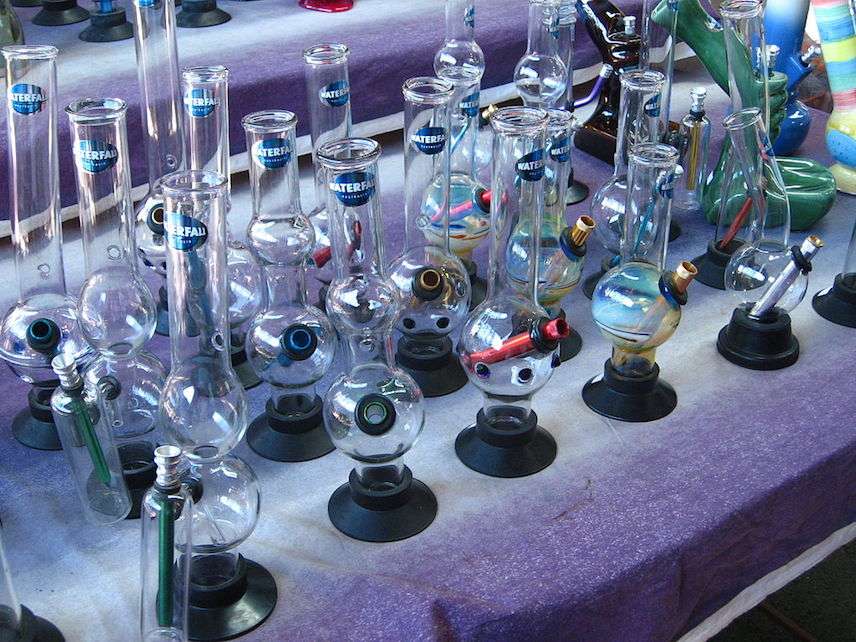Pennsylvania Town Used Confidential Informant and Undercover Cops to Arrest a Man For Selling Bongs
The assistant district attorney is now seeking jail time for the head shop owner.

Limerick, Pennsylvania must be the safest town in America. That's the only reason I can think of why police there used a confidential informant and undercover police officers to build a case against a head shop owner for selling the kinds of things one normally finds at a head shop.
According to The Mercury News, Piper's Smoke Shop owner Craig Hennesy was convicted this week of "possession with intent to deliver drug paraphernalia and advertisement of drug paraphernalia" after undercover police officers visited his store and observed glass pipes for sale, and a confidential informant purchased a grinder and rolling papers.
Assistant District Attorney Evan Correia, who prosecuted the case, argued that Hennesy had it coming because a police officer warned him before he opened his store that glass pipes were considered drug paraphernalia.
"I'm going to be asking for some sort of jail time," Correia is quoted as saying. "This defendant was warned by the police prior to his opening his store that if he started selling these items that they considered to be drug paraphernalia he would be charged with a crime."
Hennesy's attorney, meanwhile, says that the goods for sale at Piper's Smoke Shop were intended to be used with tobacco, that Hennesy told police as much before opening the store, and that when undercover officers visited the shop, Hennesy referred their attention to a sign featuring the same claim.
At his trial, the state presented pictures of Hennesy's stock and a police officer testified that "[t]hrough my training and experience I know that these glass and metal smoking pipes are commonly used to smoke marijuana. I know that the grinders are commonly used to shred marijuana prior to smoking."
Yet it wasn't Hennesy's customers who were on trial. Regardless of what they might do with his wares, he went out of his way to inform his customers—including several he didn't know to be police officers—under what conditions he could legally sell (and they could legally use) his products.
This is a grotesque argument to make against a retailer, regardless of how much you dislike the culture associated with his products. You can also smoke marijuana out of an apple; would Correia pursue charges against a local orchard owner? How about going after every gas station and corner store that sells flavored cigars, which are popular among weed smokers? And who, exactly, is Correia protecting? He said after the trial that Hennesy's customers were "mainly college kids." College kids are adults. What they do with the glassware they buy is both up to them and on them.
The fact that police used a confidential informant and undercover officers suggests either a misuse of police resources or a lack of more pressing criminal concerns. If it's the former, the people who chose to go after a head shop owner rather than provide more crucial public safety services should be disciplined. If it's the latter, then maybe the Limerick police department should downsize.
Editor's Note: As of February 29, 2024, commenting privileges on reason.com posts are limited to Reason Plus subscribers. Past commenters are grandfathered in for a temporary period. Subscribe here to preserve your ability to comment. Your Reason Plus subscription also gives you an ad-free version of reason.com, along with full access to the digital edition and archives of Reason magazine. We request that comments be civil and on-topic. We do not moderate or assume any responsibility for comments, which are owned by the readers who post them. Comments do not represent the views of reason.com or Reason Foundation. We reserve the right to delete any comment and ban commenters for any reason at any time. Comments may only be edited within 5 minutes of posting. Report abuses.
Please to post comments


A head shop owner named Hennesy.
Awesome.
When bongs are outlawed,
Only outlaws will have bongs!
Let's hope Hennesy has a good lawyer.
If it's the former, the people who chose to go after a head shop owner rather than provide more crucial public safety services should be disciplined.
BUT TEH CHILDRESNS
Limerick, Pennsylvania
I knew a guy from there, his name was Enis. I think he was originally from Nantucket though.
Damn you!
Limerick has a great big nuclear power plant, an outlet mall up the river from King of Prussia and zillions of tract homes. In other words, no tax base that cares to support hippie businesses or freedom.
Limerick has a great big nuclear power plant, an outlet mall up the river from King of Prussia and zillions of tract homes. In other words, no tax base that cares to support hippie businesses or freedom.
There once was a town name o' Limerick
In search of a marketing gimmick
But they cracked down on shops
By calling in cops
Which people found rather Hitleric.
What's the crime? Who's the victim? How is a piece of glass dangerous? You can get cut if you break it maybe?
Arrest this prosecutor if he happens to posses a newspaper. Newspapers can be used for rolling joints.
Is this 1992? Goddamn, Pennsylvania, get with the times.
Penises are commonly used to rape women. Arrest every male cop,